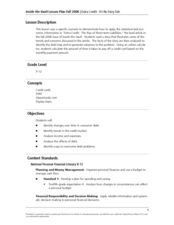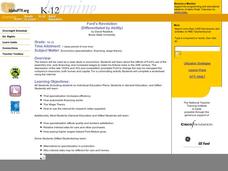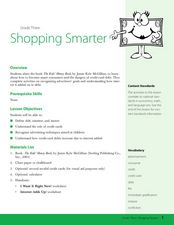Curated OER
Extra Credit: It’s No Fairy Tale
Students discuss their knowledge of payday loans and credit cards. In this Economics lesson, students complete a read an article and Q&A activity in groups, and play a vocabulary bingo game and a quiz game on payday loans. Students...
Practical Money Skills
About Credit
It's tempting to stay away from credit cards entirely, and it can also be tempting to charge large purchases on credit cards with the intention to pay them off later. But as a three-part lesson on credit and debt shows your high...
Practical Money Skills
Understanding Credit
Help your young consumers learn about credit and the importance of credit history. With a thorough instructional activity about the ins and outs of credit, as well as the potential pitfalls of having a line of credit, kids will be...
Curated OER
Debt: Who Does it Affect?
Debt is a topic that affects everybody: the community, the nation, and the entire globe. Kids take charge of debt by designing a project that informs those in their community about good financial choices, keeps personal debt low, and...
Visa
The Danger of Debt: Avoiding Financial Pitfalls
How can our perspectives of borrowing and returning influence the way we view credit? Pupils explore the concept of debt, how it impacts our ability to obtain credit, and finally the ways in which we can work to alleviate debt.
Visa
Using Credit Wisely
Receiving credit can be both a benefit and a curse. Prepare your learners to make wise credit choices by studying how credit influences credit scores, identifying the different components of credit cards, and exploring major consumer...
Curated OER
Credit - Good? Bad?
Students examine credit cards. They explore the detrimental effects that result from debt and poor credit. Students analyze interest rates, minimum balances, and consumer debt. Students survey the benefits of credit cards.
Curated OER
Debt
Fourth graders read a book about debt, credit, and interest rates and write a story about these topics. In this debt and credit lesson, 4th graders read the book Four Dollars and Fifty Cents, define the terms "debt" and "credit," and...
Curated OER
Using Credit: Not for a Billion Gazillion Dollars
Fifth graders explore the concept of credit. In this consumer education lesson, the teacher uses the book Not for a Billion Gazillion Dollars to lead the class in a discussion about credit, debit, and income. Students then analyze their...
Federal Reserve Bank
Lesson 3: A Fresh Start
The members of your economics class may be busy earning graduation credits, but the credit they should be concerned about is their financial credit. The third lesson in a unit about Hurricane Katrina and other events that can result in...
Curated OER
Balance of Payments (BOP)
Learners work through ten transactions that will help them understand credits and debts on a global scale. They then discuss each transaction in terms of the global economy. An extension activity and discussion questions are included.
Curated OER
Describe How Money Barter, and Credit Were Used in Colonial Virginia
Fourth graders listen as the teacher lectures about bartering. They work in small groups to define and create a skit about one term related to bartering. Students create an Economic Terms booklet. They review that tobacco was a cash crop...
Curated OER
Consumer Borrowing and Spending
Credit can be confusing for teens, some of whom are already using credit cards. Clear up misconceptions with this group research activity which has a solid outline with a lot of room to adjust to your needs and resources. Groups are...
Curated OER
EBT-rimental
Students engage in a lesson plan that gives them the tools needed to become knowledgeable credit consumers. The companion website for the ITV program TV-411 is used to provide learners with an interactive experience of what credit has to...
Curated OER
Taxes
Fourth graders read Stone Fax and explore earning money, saving, credit and taxes. In this taxes lesson, 4th graders complete a worksheet to develop understanding of paying off debts, keeping a checkbook, calculating sales tax and...
Federal Reserve Bank
Time Inconsistency: Today’s Actions = Tomorrow’s Regrets
Why do we choose instant gratification over maximizing lifetime satisfaction? How is this reflected in government and macroeconomics? Learn how one research analyst proposes individuals and governments can accomplish greater lifetime...
Curated OER
Go Figure: Your Credit is Built on Trust
Twelfth graders study how credit and money markets are based on trust. In this Economics instructional activity, 12th graders read and answer questions on a handout.
Curated OER
Ford's Revolution
Industrialization and mechanization of products such as cars have deeply affected the US economy. The class discusses the affects of Ford's assembly line production of automobiles. They watch a video, fill out worksheets, and investigate...
Curated OER
Shopping Smarter
Students read a book about money and smart shopping to learn about debt, advertising, and the use of credit cards. For this consumer math lesson, students read the book The Kids' Money Book and discuss economic concepts. Students...
Conneticut Department of Education
Personal Finance Project Resource Book
Balancing a budget, paying taxes, and buying a home may feel out of reach for your high schoolers, but in their adult years they will thank you for the early tips. A set of five lessons integrates applicable money math activities with...
Practical Money Skills
Saving and Investing
Learn the difference between saving money and investing money, as well as the advantages and disadvantages of each. Kids review banking and personal finance terms before studying the different ways that people can reach their financial...
Curated OER
Invest In Yourself
Young scholars learn about budgeting, saving, dept, financial management, opportunity cost, and self-regulation. In this financial management lesson plan, students apply their knowledge of finance components and create their own web...
Curated OER
A Lesson To Accompany "The First Bank of the United States: A Chapter in the History of Central Banking"
Here is an interesting topic. Learners examine the economics that led to the founding of the First Bank of America. They participate in a reader's theater experience depicting the debate between Alexander Hamilton and Thomas Jefferson...
Curated OER
Beyond the Checkbook: Choices of Payment Methods
Students explore different payment methods. In this math lesson plan, students discuss the difference between writing a check and paying online. They will compare and contrast and present their data to the class.

























